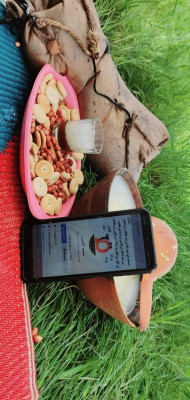Current Section: model
Lesson The Messenger ﷺ as a Husband
Allah's wisdom made the messengers human beings, so they can be an argument against people to see who follows their example. Also, to adopt their morals and do similar deeds to theirs. The happiness of a Muslim in this world and the hereafter lies in following the Book of Allah and the Sunnah of His Prophet ﷺ and following in his footsteps. That is why Muslims should be keen to know the biography of the Prophet ﷺ and his Sunnah. To strive to imitate him in all circumstances.
The life of the Prophet ﷺ in his home and with his wives is the best example for all mankind, and he is the example that should be followed by every husband who wants his family to have a good life in this world and to gain entry into paradise in the next life. Allah says: (Indeed, in the Messenger of Allah, you have an excellent example for whoever has hope in Allah and the Last Day and remembers Allah often.) [Al-Ahzab: 21].
The Hig-level Manners of the Prophet ﷺ with his Wives
On the authority of Aisha, may God be pleased with her, that the Messenger of Allah ﷺ said: «The best of you is the best to his family, and I am the best of you to my family.» ( At-Tirmidhi, 3895) The Prophet ﷺ commands the men of his nation to do good to their women, and he praises those who do that, then shows that he is their example in that.
The Prophet ﷺ Giving Comfort to His Wives and Fulfilling their Legitimate Wishes
Aisha (may Allah be pleased with her) was reported to have said: «I saw the Prophet,ﷺ covering me with his robe, while I was looking at the Abyssinians playing in the mosque, until I was the one who was tired, so estimate the value of the young slave girl who is eager to have fun.» (Al-Bukhari 5236, Muslim 892). It is following the example of the Messenger ﷺ for the husband to be aware, and interested in his wife’s wishes, appreciating her legitimate psychological needs and fulfilling them for her.
The Messenger of Allah ﷺ considered a man playing with his family as an authorized form of amusement and denied that it was from reprehensible fun. The Prophet ﷺ said: «Everything that the son of Adam plays with is void, except for three: shooting (arrows) from his bow, training his horse, and playing with his family, for they are from the truth.» (Ahmed 17337).
It has been established that Aisha (may Allah be pleased with her), while she was on a journey along with the Messenger of Allah ﷺ, said: "I raced with him (the Prophet), and I outran him. When I became fleshy (again), I raced with him (the Prophet), and he outran me. He said: «This is for the last time you outran me.» (Abu Dawud 2578) So the Prophet ﷺ used to play with his wives and joke with them so that married life does not remain monotonous and boring.
The wisdom of the Prophet ﷺ in dealing with family problems.
No house is not free from all problems occurring among its members, and the Prophet ﷺ gave us the most beautiful examples of how to deal with these problems. For instance, on the authority of Anas (may Allah be pleased with him), who said: "The Prophet ﷺ was with some of his wives, so one of the mothers of the believers sent a dish with food in it, and the woman in whose house the Prophet ﷺ was in hit the hand of the servant, so the dish fell and it broke, so the Prophet ﷺ gathered the dish, then began to collect the food that was in the dish. And he says: «Your mother was jealous.» So then he detained the servant until he brought a dish from the woman in whose house he was. (Al-Bukhari 5225).
The chest of the Prophet ﷺ was not hurt by the actions that came out because of the intuitive feelings of his wives or the people of his household, and he dealt with all situations with remarkable tact and wisdom. And if the problem seemed like it would end up in an argument, then the Prophet ﷺ with his wisdom and not overreacting and being angry, changed the situation, defused the tension, and was fair to all sides involved.
The Prophet ﷺ accepted the fact that his wife would be angry with him and would show that, and he would return that with kindness and mercy. On the authority of Aisha, ﷺ who said: "The Messenger of Allah ﷺ said to me: «I know when you are pleased with me and when you are angry with me." She asked how he knew that and he replied that when she was pleased with him, she said, "No, by Muhammad's Lord," but when she was angry with him, she said, "No, by Abraham's Lord." She said, "I swear by Allah, O Messenger of Allah, that is so; it is only your name that I omit.»(AL-Bukhari 5228, Muslim 2439).
The Good Treatment of the Prophet ﷺ to His Wives
The Prophet, ﷺ used to help his wives in the affairs of the house and chores out of mercy for them and to make ease for them, and it was one of his morals, ﷺ to serve himself in his private affairs.
Aisha (may Allah be pleased with her) was asked: "What did the Prophet ﷺ do at home?" She said: "He used to be involved in the work of his family - meaning serving his family - and when the time for prayer came, he would go out to pray." (Al-Bukhari, 676) And she said in another narration: "The Messenger of Allah ﷺ used to mend his shoes, sew his clothes, and help around the house as any person would do at home." (Ahmed, 25341).
Ways of Becoming Endeared to one's Wives
Calling wives with words of endearment
In a narration, the Prophet ﷺ said to Aisha (may Allah be pleased with her): «O Aisha! This is Gabriel sending his greetings to you.» He also used to call her “al-Humira,” which is a diminutive form of red, i.e., light red or white.
The husband feeding his wife
On the authority of Saad bin Abi Waqqas (may Allah be pleased with him), who said that the Messenger ﷺ said: «And whatever you spend, it is charity, even the morsel that you take into your wife’s mouth.» (Al-Bukhari 2742).
The husband declaring his love for his wife.
On the authority of Amr ibn al-Aas, (may Allah be pleased with him) who said that the Prophet ﷺ sent him to the army of Dhat Al-Salasil. He said: So I went to him and said: Who is the most beloved person to you? He said: «Aisha.» (Al-Bukhari 3662, Muslim 2384).
Listen and pay attention to them when they speak
Evidence for this is the long hadeeth of Umm Zar’, in which Aisha (may Allah be pleased with her) narrated the story of eleven women where they sat. Each one of them began to talk about her situation with her husband, so the Prophet ﷺ continued to listen to Aisha until she finished telling the story of what happened between them completely.
The Prophet ﷺ adorned and beautified himself for his wives
Where Aisha (may Allah be pleased with her) was asked: "What did the Prophet ﷺ begin by saying when he entered his house? 'A'isha said: "I used to apply the sweetest perfume I could find on the Prophet till I saw it shining on his head and beard." (Al-Bukhari 5923).
The loyalty of the Prophet ﷺ to his wives
One of the clearest examples of this loyalty is what happened to the Prophet ﷺ with Khadija (may Allah be pleased with her) years after her death. Zainab, the daughter of the Prophet ﷺ wanted to ransom Abu Al-Aas - he had married her before Islam and was a prisoner in Badr - with Khadija's necklace (may Allah be pleased with her). The Prophet ﷺ longed to see the necklace again. So he said: «If you see that you release her captive, and return to her what is hers.» (Abu Dawud 2692). And his loyalty to her reached the point that it made Aisha (may Allah be pleased with her) jealous of her, and she was the one who did not know her or lived at the same time as her. The Prophet ﷺ mentioned her frequently, and he would even slaughter sheep and divide it into parts, and then send it to the friends of Khadija. I told him, "As if there was no other woman in the world except Khadija." He would say: «She was like this and like that, and I had children from her.» (Al-Bukhari, 3818, and Muslim, 2435).
Manifestations of the justice of the Prophet ﷺ between his wives
Appreciation of the Prophet ﷺ for his wives and their advice
And it is not more evident than the Prophet's seeking advice from his wife, Umm Salama (may Allah be pleased with her), on the day of Hudaybiyah, when he asked the Muslims to slaughter and shave their heads, but none of them got up. So he went to Umm Salama and told her what had happened. She said: "O Prophet of Allah, does that please you? Please do not speak to them until you slaughter your animal, and call a person to shave your head. So he went out and did not speak to any of them until he sacrificed his animal, called someone, and had his head shaved, and when they all saw that, they too stood up and slaughtered their animals and shaved each other's heads." (Al-Bukhari 2731)





